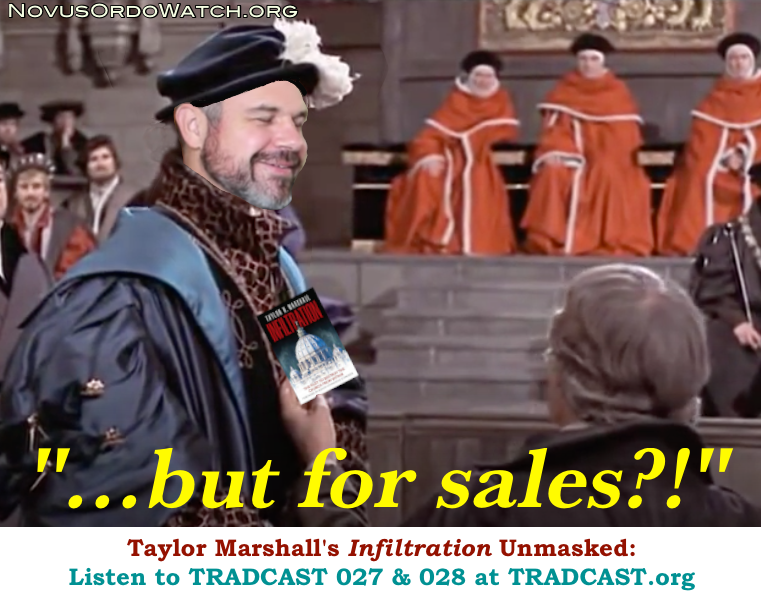Total run time: 2 hrs 1 min…
TRADCAST Episode 028
Taylor Marshall’s Infiltration Unmasked (Part 2)
Traditional Catholic Podcast
CLICK HERE FOR MORE INFORMATION
AND TO LISTEN TO ANY EPISODE
We are happy to announce the release of our latest podcast episode, TRADCAST 028. It continues our hard-hitting critical review of Dr. Taylor R. Marshall’s best-selling book Infiltration: The Plot to Destroy the Church from Within (2019).
As we showed in Part 1 (TRADCAST 027) already, what has been marketed by the publisher as a “carefully documented book” and by the author himself as his “greatest literary accomplishment” is in actual fact little more than an embarrassingly sloppy hack job. Whereas Part 1 of our critique reviewed the foreword and Chapters 1-20 of Infiltration, the newly-released Part 2 covers the remaining chapters and investigates how it is Marshall’s book already had over 800 overwhelmingly positive Amazon reviews on the print edition’s launch day.
You can listen to this podcast free of charge by clicking the YouTube video above, or you can go to our TRADCAST 028 page, where you will find all the information you need for this show, including links to all the articles, blog posts, Church documents, etc., mentioned in the podcast, and where you will also find ways to download this episode to your computer and sign up to be notified of new episodes by email.
TRADCAST 028 consists of two segments. In the first one, we examine a wide range of problems found in Chapters 21-32 of Infiltration, such as Marshall’s error about Archbishop Marcel Lefebvre’s role in the creation of the Ottaviani Intervention and his demonstrably false claim that Cardinal Giuseppe Siri supported the candidacy of “Cardinal” Karol Wojtyla (later “Pope” John Paul II) in the October 1978 conclave.
Throughout Infiltration, Marshall’s poor research and writing, atrocious documentation, and sloppy proofreading are apparent. Unsupported and even erroneous claims are no rarity in this book. Even when documentation is given, it is no guarantee that the source backs up what the author says (case in point: footnote 124 on p. 180, which cites the Oct. 30, 1978 Time article “A Foreign Pope”, does not back up Marshall’s assertion that John Paul II had first considered choosing Stanislaus for a papal name). Hilarious linguistic howlers — such as Marshall talking about a “negative deficit” or an “allocution” instead of a “locution” — are just the amusing icing on the cake.
The author’s reasoned conclusions are also less than exemplary. For example, on p. 192 he claims that John Paul II “was certainly not an infiltrator of the Church”, a completely gratuitous and unsupported assertion that, if anything, is abundantly contradicted by just about everything else he writes in Chapter 26. Similarly, on p. 225 Marshall claims that the “Revolution in Tiara and Cope” desired and planned by Freemasonry did not come to fruition until the 2013 conclave that elected Jorge Bergoglio (“Pope Francis”), yet it is clear from the rest of the book that that revolution had already triumphed at Vatican II in the 1960s, called by Angelo Roncalli (John XXIII) and ratified by Giovanni Montini (Paul VI).
Chapter 29 is noteworthy for a different reason. Intriguingly entitled “Infiltration and the Plot against Benedict XVI”, this ridiculously brief chapter — a mere two pages in length — doesn’t mention anything about a plot against Benedict XVI at all. The title is simply wrong — it does not reflect the content of the chapter.
In Chapter 32, Marshall attempts to “solve the current crisis”, and he does so by examining various possible positions one might take in response to the infiltration of the Church — becoming a Modernist, an atheist, a Protestant, an Eastern Orthodox, a sedevacantist, or a Resignationist — before defending the popular recognize-and-resist position as the correct option, according to which one must essentially recognize the Vatican II “Popes” as true Popes but refuse them submission by resisting their teachings, laws, canonizations, and sacramental rites insofar as one discerns them to be erroneous, heretical, sacrilegious, or otherwise evil or harmful.
In that chapter especially, Marshall’s argumentation is abysmal. Looking for a “consistent narrative” rather than simply the truth of the matter, the author doesn’t even attempt to refute atheism but merely explains why atheism is not an option for him: because, so he says, he has “personally encountered Christ” and “remain[s] fully convinced of the existence of God…” (Infiltration, p. 231). Subjective experience and personal conviction as the answer to atheism — from a Ph.D. in Thomistic philosophy, no less? What is going on here?!
Further on in the same chapter, Marshall presents his critique of Sedevacantism, which we examine and compellingly refute — although even calling it a “critique” is giving him too much credit because he totally misses the essence of the sedevacantist position and contents himself with setting up a strawman by reducing Sedevacantism to problems with the 1958 conclave, something allegedly stated in the Third Secret of Fatima, and the material/formal thesis of Fr. Michel-Louis Guerard des Lauriers, whose solution to the question of how to restore a Pope Marshall mysteriously skips over entirely, all the while claiming that Sedevacantism “lacks a means for restoring the papacy on earth” (p. 235).
After a brief advertising break, sparks fly in the second segment of TRADCAST 028, where we take apart Taylor’s defense of his own recognize-and-resist position and offer other critical comments regarding Chapter 33 and the remainder of the book. We then point to other reviews of Infiltration that have been published online, all of which are linked in our show notes (see TRADCAST 028).
Special attention is then paid to Marshall’s “Infiltration Launch Team”: At the end of the book, the author generously lists the names of over 2,000 individuals on eight-and-a-half pages — in small print! He thanks them for “read[ing] this book before publication and also help[ing] us with promotion.”
Promotion, indeed, is key for Marshall. The print edition was released on May 31, 2019, on which day the author triumphantly sent the following tweet, which he has since removed but which is archived here (annotations added by us):
On the day of release, Marshall tweets triumphantly about his book, including a screenshot of Amazon.com showing that his book has five stars from a total of 813 reviews – on the print edition’s launch day!
How did Marshall get this many reviews — virtually all of them giving the book a perfect 5-star rating — on the very day of the book’s release?
The answer seems to be found in Taylor’s public strategic recruitment of an army of people committed to promoting his book. In early April of 2019, he had published an application form on his blog that allowed people to register to be on the Infiltration Launch Team. The post has since been removed, of course, but an archived version is available here. Further details are explained in the podcast.
Here we must point out something that we were not aware of until after we had already published TRADCAST 028: Unbeknownst to us, the electronic edition of the book (for Amazon Kindle) had been released eight days prior, on May 23, 2019. Since Amazon mixes the reviews for the electronic edition together with those for the print edition, it is reasonable to assume that a certain number of those 813 reviews legitimately came from readers of the electronic version. We apologize for this oversight, which changes things a little bit, but not significantly. The fact remains that (1) the total number of reviews is absurdly high for a book that has been on the market for only a few days; and (2) Taylor had explicitly and openly recruited reviewers for his book he all but knew would leave a positive rating, and he explicitly instructed them not to reveal that they had been given an advance copy (see annotated screenshot from Marshall email to launch team member here).
Was this an instance of astroturfing on Marshall’s part? The practice is officially defined as “the deceptive tactic of simulating grassroots support for a product, cause, etc., undertaken by people or organizations with an interest in shaping public opinion” (source). Whatever the case may be, it is obvious that 813 almost entirely positive reviews on the print edition’s launch day must have boosted sales tremendously.
TRADCAST 028 concludes by considering some of the things a book exposing the Masonic infiltration of the Catholic Church ought to include but Marshall’s Infiltration curiously left out. We also issue a challenge to Taylor Marshall — one we are sure he will never accept — and wonder what his real motivation for writing and releasing Infiltration was.
Appropriating St. Thomas More’s question to Richard Rich in A Man For All Seasons: “Why Richard, it profits a man nothing to give his soul for the whole world… but for Wales?!”
One thing is clear: No matter what you think of Taylor Marshall, Novus Ordo Watch, or Sedevacantism, you will not regret listening to this highly-informative 121-minute podcast.
So, what are you waiting for? Listen to TRADCAST 028 now! But be forewarned: You will be drinking from a fire hose of information for two hours straight!
Don’t miss this podcast and share it with family and friends, especially those who have purchased, or have considered purchasing, a copy of Infiltration! Friends don’t let friends spend money on a hack job by Taylor Marshall!
Please spread the word about TRADCAST 028.
Image sources: archive.is (archived screenshot of twitter.com; annotated) / own meme based on screenshot from A Man for all Seasons (1966)
License: fair use / fair use







No Comments
Be the first to start a conversation